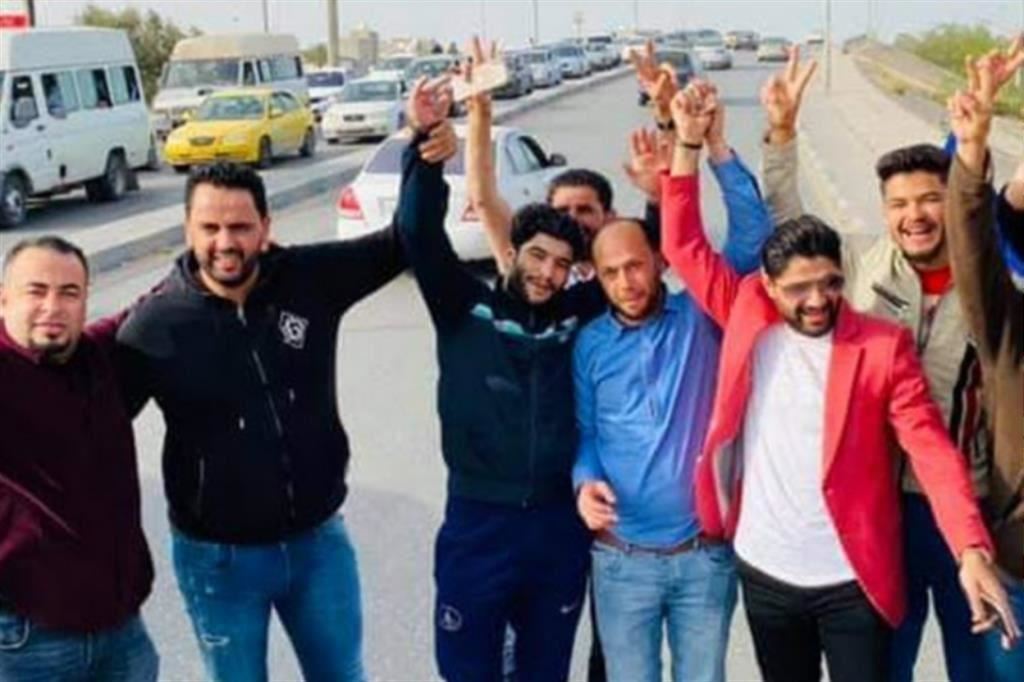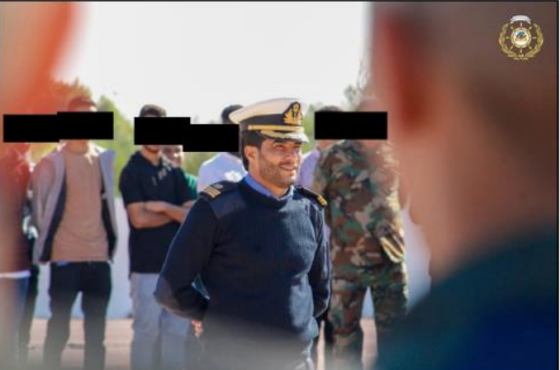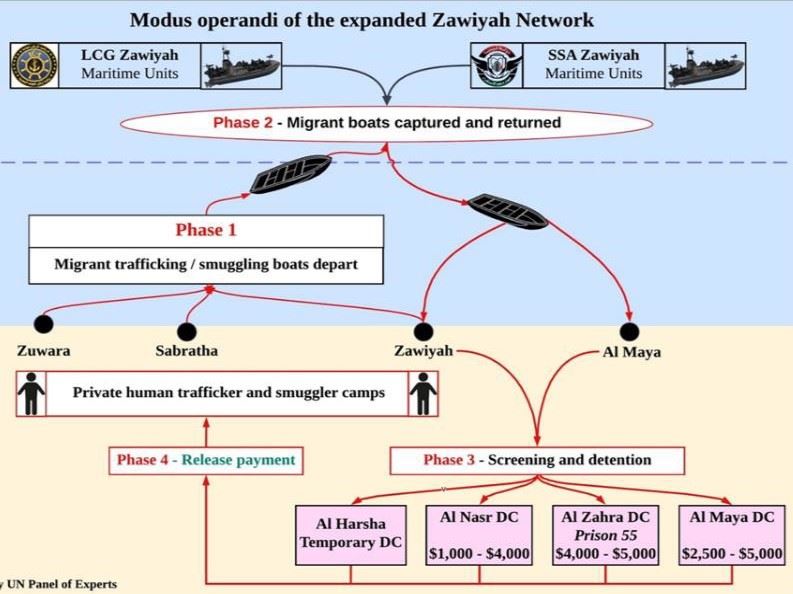UN Security Council sanctions against Libyan officials working with human traffickers
2023-10-24 18:38:34 Written by Martin Plaut Published in English Articles Read 2042 times
The full UN Security Council Panel of Experts report can be user_email=This email address is being protected from spambots. You need JavaScript enabled to view it.">found here. These are some of their findings. The Panel identified three such illegal enterprises that have been operating in The Panel determined that the commander of the Petroleum Facilities Guard in Zawiyah, Mohamed Al Amin Al-Arabi Kashlaf (LYi.025), and the commander of the Libyan Coast Guard in Zawiyah, Abd al-Rahman al-Milad (LYi.026), together with Osama Al-Kuni Ibrahim (LYi.029), continue to run a large trafficking and smuggling network in Zawiyah. Since the two commanders were listed in 2018, they have further expanded that network by including armed entities operating in the Warshafanah, Sabratah and Zuwarah areas. The expanded Zawiyah Network now encompasses elements of 55 Brigade, the Stability Support Apparatus command in Zawiyah, and in particular its maritime units, and individual members of the Libyan Coast Guard, all operating with a view to executing the Network’s common plan of gaining substantive financial and other assets from human trafficking and migrant smuggling activities. The Network has established an irregular detention system that comprises the Al-Nasr, Al-Maya and Al-Zahra detention centres for migrants, as wells multiple temporary detention places in the areas of Zawiyah and Harsha, where elements of the Network committed serious violations of international humanitarian law and international human rights law against 34 detainees. This detention system has enabled the Network to exercise physical control of trafficked or smuggled persons for the purpose of gaining financial and other profits for the benefit of its members. user_email=This email address is being protected from spambots. You need JavaScript enabled to view it.">https://documents-dds-ny.un.org/doc/UNDOC/GEN/N23/234/61/PDF/N2323461.pdf?OpenElement Source: user_email=This email address is being protected from spambots. You need JavaScript enabled to view it.">Avvenire Libya. The UN Security Council confirms sanctions on coastguard traffickersNello Scavo Friday 20 October 2023 The tightening of sanctions for the bosses of human beings, oil and arms trafficking was unanimously approved. From the coast guard "Bija" to the heads of the "oil police" up to the director of the "lagers"
In the center the major of the Libyan coast guard al-Milad (Bija) and to his left, in a blue shirt, Mohammed Kashlaf, head of the "oil police" accused of being the head of the criminal organization · Libya is not a safe port of disembarkation, and the direct connections between the Libyan coast guard and traffickers in human beings, oil and weapons are the driving force behind the chain of exploitation and enrichment. The United Nations Security Council unanimously accepted the requests of the UN investigators , who proposed tightening sanctions against the main bosses of a criminal system that brings together politics, militias and clans. The decision puts the Italian government and the Piantedosi directives in difficulty, according to which humanitarian rescue organizations should first coordinate with the so-called Libyan coast guard, which the UN instead indicates as one of the main mechanisms of the criminal system. After a long internal discussion, the Security Council accepted the requests of the UN investigators in Libya, whose mandate was renewed until 2025. The representatives for whom the freezing of assets and the absolute travel ban are requested are five, but one died on March 16 this year in Egypt. The other members of the "Libyan poker" are heavy names, starting with Saadi Gaddafi, the ex-footballer son of Colonel Gaddafi, who is trying to sell a property in Canada by circumventing the sanctions also through the Libyan consulate in Turkey. The fifty-year-old Gaddafi would have traveled undisturbed and on 27 June 2023, UN experts wrote to the Turkish government «regarding the implementation of the asset freezing and travel ban measures. No response was received." According to investigators, Gaddafi's signature on a power of attorney filed in Turkey constitutes "proof of Turkey's failure to comply with the travel ban measure". If the Gaddafis represent the past that continues to loom over Libya, especially due to the enormous legacy left by the dictator patriarch and never truly quantified, the list of those sanctioned includes the new bosses of today's Libya. Like Mohammed Al Amin Al-Arabi Kashlaf . "The Group of Experts has established that the Petroleum Facilities Guard of Zawiyah is an entity that is nominally under the control of the Government of National Unity", therefore not a private police in the strict sense but an armed group affiliated to the central authorities and responsible for monitor the main oil plants, from which however a certain quantity of hydrocarbons is illegally disappeared and then placed on the European market thanks to a dense network of smugglers. "The group of experts - it continues - has asked the Libyan authorities to provide updated information on the implementation of the asset freeze and travel ban against this individual, including details on the current status and chain of command of Petroleum Facilities Guard in Zawiyah, as well as on his financial activities and personal economic resources." Also in this case the Libyan authorities "have not yet responded". Connected to Kashlaf is Abd al-Rahman al-Milad , perhaps the best known of the clan. Also known as "Bija", he used "forged United Nations documents in an attempt to lift the travel ban and asset freeze imposed on him". However, Bija moved forward, finding support both "in the Libyan government and in private interlocutors within Libya", with the aim of obtaining support "for his request for cancellation" of the sanctions. In particular, UN investigators are in possession of "an official Libyan document, issued on 28 September 2022 by the Office of the Attorney General, in which the responsible authorities are ordered - the experts report - to remove Al-Milad's name from the system national monitoring of arrivals and departures". A cover-up at the highest level of the judiciary, which had already acquitted him of the oil trafficking charges, and which "would allow Al-Milad to leave Libya with the assets in his possession, in violation of the asset freezing measure". On 25 January 2023 «the Panel asked the Libyan authorities to provide updated information on the effective implementation of the asset freeze and travel ban against Al-Milad. The request was made following the resumption of his professional duties in the Libyan Armed Forces, including appointment as an officer at the Janzour Naval Academy following his release from pre-trial detention on 11 April 2021." Nine months later, the Libyan authorities "have still not responded".
The resolution approved by the Security Council is also based on another accusation from the «Panel of Experts» who «established that the commander of the Petroleum Facilities Guard of Zawiyah, Mohamed Al Amin Al-Arabi Kashlaf, and the commander of the Guard coastal Libyan Zawiyah, Abd al-Rahman al-Milad (Bija), together with Osama Al-Kuni Ibrahim , continue to operate a vast trafficking and smuggling network in Zawiyah." The sanctions did not hurt them. “Since the two commanders were listed in 2018, they have further expanded the network to include armed entities operating in the Warshafanah, Sabratha and Zuara areas.” Everything revolves around prisons for refugees. « The Zawiyah network continues to be centralized in the Al-Nasr migrant detention facility in Zawiyah, managed by Osama Al-Kuni Ibrahim», Bija's cousin identified thanks to some images published by Avvenire in September 2019. The name he appears in several investigations. Based on «ample evidence of a consistent pattern of human rights violations, the Panel found - the panel added - that Abd al-Rahman al-Milad and Osama al-Kuni Ibrahim continued to be responsible for acts of torture, forced labor and other ill-treatment of persons illegally confined in the Al-Nasr detention centre ", with the aim of extorting "large sums of money and as punishment". The criminal business model is precisely what Rome does not want to recognize, but which the UN investigators and the Security Council reiterate: «Zawiyah's expanded network - we read in the report - now includes elements of the 55th Brigade, the command of the Stability Support Unit in Zawiyah, particularly its maritime units, and individual members of the Libyan Coast Guard, all working to execute the network's joint plan to obtain significant financial and other resources from human trafficking activities and migrants".
The graph with which UN experts showed the Security Council the criminal system involving members of the Libyan coast guard and human traffickers - Panel of UN experts The Security Council was shown the scheme which includes «four operational phases: (a) the search and return to land of migrants at sea; (b) the transfer from disembarkation points to the detention centers of the Directorate for the fight against illegal migration; (c) the abuse of detainees in detention centers; (d) the release of prisoners who are victims of abuse." Once the migrants are released, they re-enter the cycle of exploitation: put back into the sea, leaving a percentage to be captured by the coastguards to justify Italian and European support for the so-called Libyan coast guard, and again «transfer from the disembarkation points to the centers of detention by the Directorate for the fight against illegal migration; the abuse of prisoners in detention centers; the release of prisoners who are victims of abuse". The UN report and the unanimous vote of the 15 countries that sit in the Security Council are a slap in the face. «With regards to the travel ban and the freezing of assets - we read in a summary note of the session at the Glass Palace -, the Member States, in particular those in which the designated persons and entities are based, have been invited to report" to the Sanctions Committee on "their respective actions to effectively implement both measures in relation to all persons included in the sanctions list". All the exponents indicated by the "Panel of experts" are included in the Interpol "alert" list. The resolution approved yesterday also concerns the smuggling of oil and weapons. The Security Council extended “the authorization of measures to stop the illicit export of petroleum products from Libya and the mandate of the group of experts helping to oversee this process.” |























